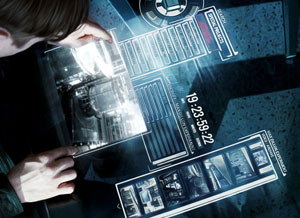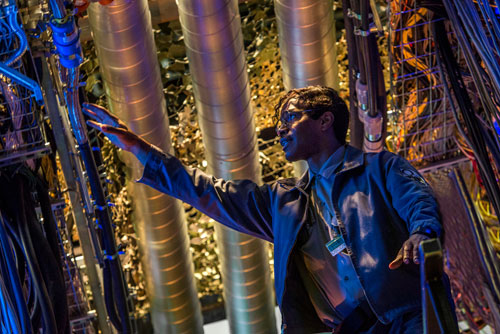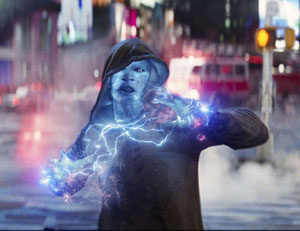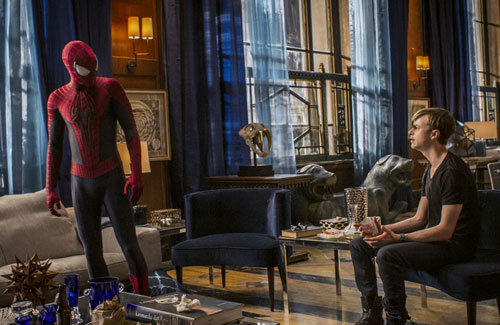Blog / The Amazing Spider-dope
- Date
- May 6, 2014
- Tags
I was amazed that I liked the first Amazing Spider-man. The subplot with the construction workers and the cranes was unbearably cheesy and Dr. Connors’ underground lab made no sense, but the action was good, the stakes were clear, and Peter and Gwen had a great dynamic and some real chemistry. The high school fight was authentic, I’m told, given the way Spider-man moves, improvises, and cracks wise.
Now for the sequel to ruin everything.
Warning: spoilers. But they’re all dumb, so you might be better off knowing this nonsense in advance.

Amazing Spider-man 2 opens with Peter Parker’s father, Richard, and his mysterious double life that everyone figured out while watching the trailers for the first movie. Big shock, he was a researcher at Oscorp labs and responsible for the radioactive spiders that basically ruined his son’s life. Hey, that’s supposed to be a big shock. I don’t see your jaw on the floor.
Richard Parker discovers that Oscorp is going to sell its biological weapons to a foreign power (PROTIP: this is treason, only the Secretary of State can authorize international weapon sales) and flees Snowden-style with his research (PROTIP: grab yo kid, grab yo wife, call the FBI and go into witness protection). He leaves his son with his sister or sister-in-law and takes a private jet with his wife to God knows where. Oh neat, your jaw’s on the floor now.
What was Richard’s plan? If he felt so threatened by Oscorp that he fled the country, did he really think they wouldn’t target his son? He did absolutely nothing to conceal Peter’s location or identity. They sent an assassin on the flight, I don’t think an after-school kidnapping is out of bounds. For that matter, what was Oscorp’s goal? If Richard just made a copy of their research, then sure, killing him ties up that loose end. Strange that they didn’t do anything once the assassin failed to check in after the flight. That seems like something worthy of a follow-up.

I’m trying to be good and ignore the outrageously unrealistic use of technology in this movie, like the circa 1999 private plane whose Internet connection remains steady while an engine is on fire and the cabin has lost pressure and they’re dropping out of the sky; the magic data cube Norman Osborn gives Harry that contains gigabytes of video and turns his desk into a Microsoft Surface (couldn’t just encrypt a folder on the network?); and the Oscorp internal employee search that displays faces of non-matches, takes more than 500 milliseconds, and lets a security employee enter commands to stop the search in progress (hey Oscorp: fire your database admin).
Whoops, I failed.
Speaking of Oscorp, why did Norman send his son Harry away to boarding school for over a decade? Norman recognizes his son’s scientific genius, why not keep him in the family business trying to solve the hereditary disease? I appreciate that Mr. Osborn values a liberal arts education, but if Harry’s going to turn into Darth Sidious the moment he graduates, shouldn’t you put this highly motivated child prodigy in a lab where he can do some good?
Maybe Harry could help Peter Parker with his priorities. I know the premise of Spider-man is that being a superhero affects Peter’s normal life, but I don’t blame Gwen Stacy one bit for leaving him. Petty criminals stealing plutonium seems like something the local police could handle. Or not, considering their pursuit-modified Crown Victorias can’t accelerate past a tow truck dragging an armored car. So Peter’s late for his graduation, late for dinner, and possessing Phillip J. Fry’s capacity for pursuing women, where the strategy is to write “I love you” in a large enough font that she never leaves you. I’m kind of surprised that Max Dillon didn’t think Spider-man was talking to him.

Max is a nerdy scientist who’s saved by Spider-man and is then his biggest fan. He becomes Electro, the electricity supervillain, after Oscorp flouts OSHA safety regulations for the fifty billionth time and Max falls into a vat of electric eels.
Now, if you’re Oscorp and the last employee who was affected by your biologic research turned into a supervillain and threatened Manhattan, what would you do with Max as he lies charred on the floor? Would you clean up the mess, erase all records of the employee, and send his corpse to the morgue to be cremated?
You would? Excellent! Who did you send to take care of that? Brock Hardass, your trusted no-nonsense henchman, who would personally oversee every step of the process? Oh. You didn’t. You sent Joe the Intern, who couldn’t convince your systems administrator to purge Max Dillon’s employee file immediately and just dumped the corpse at the morgue and told them to take care of it whenever. Ugh. Well, the CEO’s secretary is your boss now, maybe this can’t be helped.

Don’t ask how, but Electro gets loose and terrorizes Times Square by doing his low-rent Dr. Manhattan impression. With the help of Spider-man and the police and fire departments, Electro is subdued. And then, for assaulting police officers and endangering the lives of hundreds of civilians and causing millions of dollars in property damage - all on the national news - Electro is put on trial and sentenced to life in prison.
Hah! Just kidding. He’s returned to Oscorp no questions asked. The cops don’t monitor his location, Spider-man doesn’t keep tabs on him after realizing he’s Max Dillion, nobody from the news investigates the biggest story since Dr. Curt Connors turned into The Lizard.
Meanwhile at Oscorp (motto: Come And Get Us, Trial Lawyers!) Harry Osborn discovers the company’s secret projects, codename Project Secret Projects. The guy who wanted to call it something innocuous like “Janitorial Wastewater Analysis 2003” must have been voted down. It’s there that Harry discovers the radioactive spider venom his father thought might cure their hereditary disease. He seems to know that Spider-man was bitten by one of Oscorp’s radioactive spiders, so he reviews security camera footage of the lab before Spider-man appeared in New York and deduces it’s Peter Parker.
Hah! Sorry, kidding again. Oscorp uses proprietary data storage blocks that connect to transparent capacitive office desks for their secret projects but doesn’t invest in things like security cameras and tape backup.
Anyhoo, Harry believes Spider-man’s blood will cure his disease and asks Peter Parker to convince the web-slinger to donate some. Spider-man’s being remarkably thoughtful as he turns Harry down, worrying more about the billionaire’s safety than the fact that Spidey’s blood will identify him as the son of Richard Parker. Unfortunately the webbed one doesn’t consider how a doomed, emotionally stunted billionaire might retaliate when denied what he believes to be a life-saving cure.

You might answer “by throwing the vast resources of his company at capturing Spider-man” but Harry is booted out of Oscorp after Evil Businessman faked a file somewhere. This seems as logical as any other corporate action given that Harry can force his board of directors to answer directly to the secretary. Technically powerless but probably still in command of millions of dollars, Harry bluffs his way into the Ravencroft Institute to rescue Electro and take revenge on Spider-man.
What follows is a predictable fight-the-villain-in-his-lair sequence where Spidey confronts Electro in a power plant. Our heroes win after a lecture about eighth-grade science, the kind of thing you’d think Max Dillon - who designed the power plant - wouldn’t fall for.
Confession: I didn’t know Gwen Stacy was going to die. I didn’t realize she had to wear that specific outfit when she died, so it was kind of a shock. Peter’s grief seems appropriate, and throws into relief the whole “Peter Parker is just like me because he has normal person problems.” Yeah, like paying the rent, worrying about his relatives… oh, and being hunted by an infinite number of monsters and/or gangs and causing the death of at least one member of each family he’s close to. Sheesh.
It’s amazing he’s still sane.
